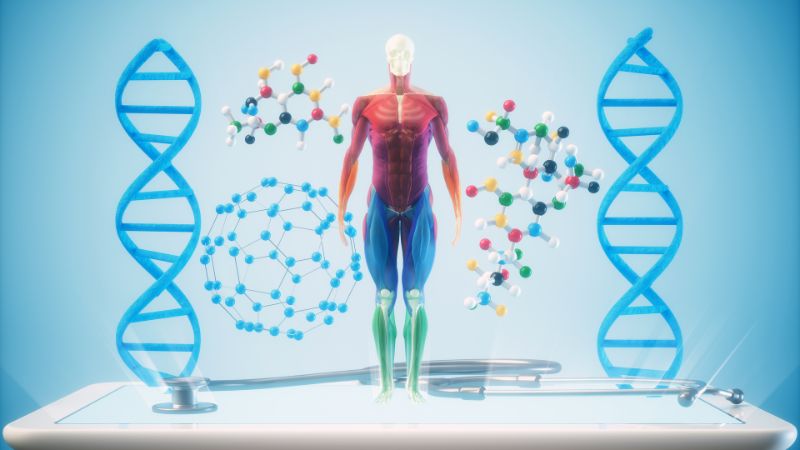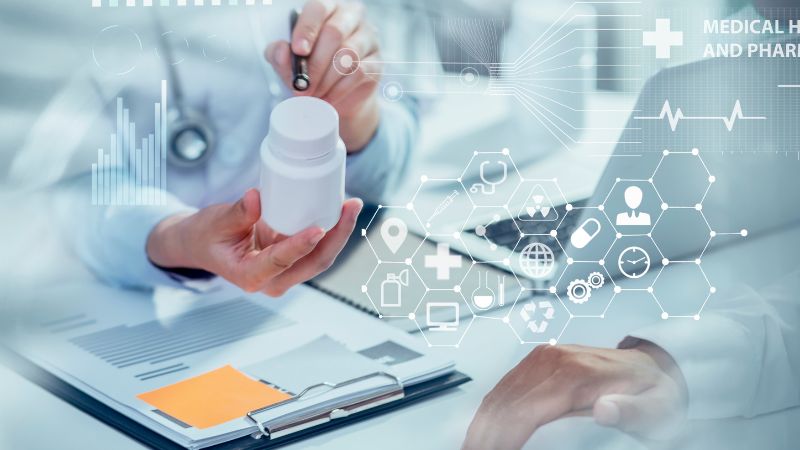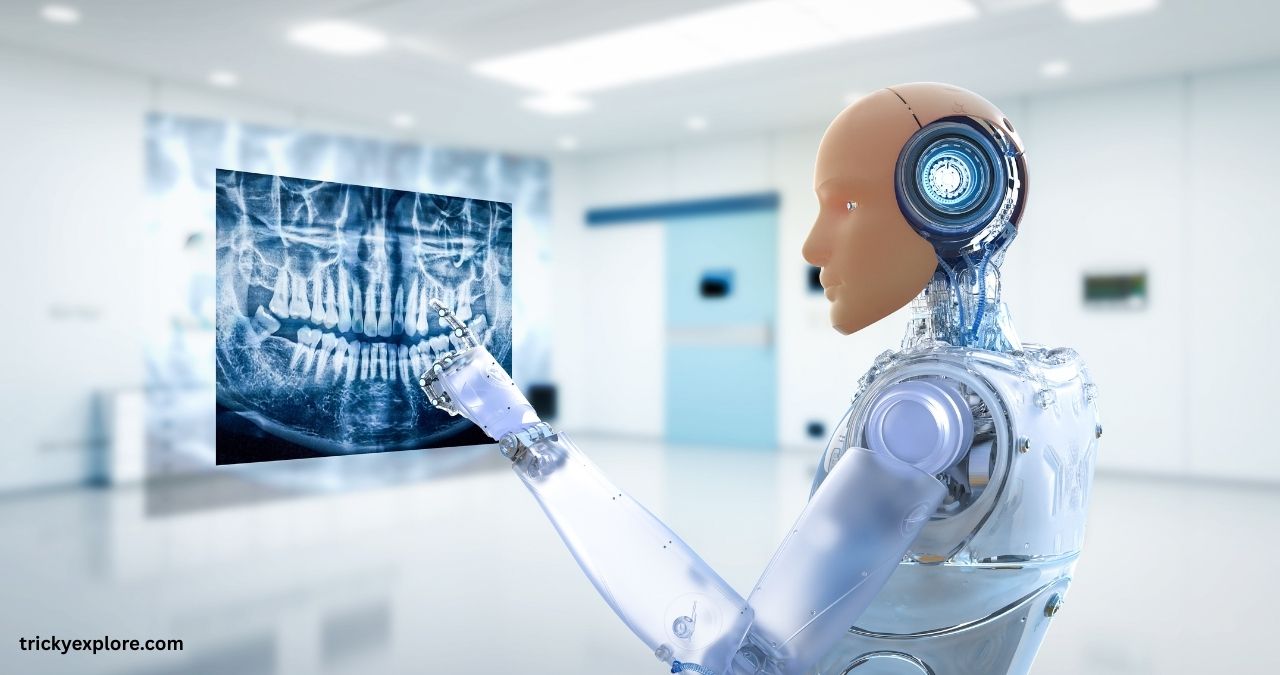Table of Contents
ToggleWhat Is AI in Healthcare?
AI in healthcare uses smart algorithms to analyze medical data, spot patterns, and make predictions. Think of it like a super-powered assistant for doctors, helping them diagnose diseases accurately and craft treatments that fit you perfectly. From scanning X-rays to decoding your DNA, AI is changing the game.
Why does this matter? Because AI in disease diagnosis catches issues early, and personalized medicine with AI ensures treatments work better for you. Let’s explore how this works!
AI in Disease Diagnosis: A New Era of Accuracy

How AI Diagnoses Diseases
AI tools excel in specialties like:
- AI in radiology: Spotting lung cancer in CT scans with 95% accuracy, as seen in tools like Google’s DeepMind.
- AI in cardiology: Predicting heart attacks by analyzing ECGs, like Stanford’s AI model.
- AI in dermatology: Identifying skin cancer from photos, with IBM Watson achieving dermatologist-level accuracy.
- AI in ophthalmology: Detecting diabetic retinopathy, helping prevent blindness, as shown by IDx-DR’s FDA-approved system.
- AI in gastroenterology: Finding polyps during colonoscopies, improving early cancer detection.
- AI in neurology: Diagnosing Alzheimer’s through brain scans, with models reaching 99% accuracy at MIT.
3 Tricks to Understand AI Diagnosis
- Ask About AI Tools: Next time you visit a doctor, ask if they use machine learning in healthcare for diagnostics—it’s becoming common!
- Trust but Verify: AI is accurate but not perfect. Always get a second opinion for major diagnoses.
- Stay Informed: Follow health tech blogs to learn about new AI in pathology or AI in cardiology breakthroughs.
AI isn’t replacing doctors—it’s giving them superpowers to save lives!
Personalized Medicine with AI: Tailoring Treatment to You

How AI Personalizes Medicine
Here’s how precision medicine with AI shines:
- Genomic data analysis with AI: AI decodes your DNA to find the best drugs for your body. For instance, in cancer care, AI matches patients with targeted therapies based on tumor genetics.
- AI-driven drug discovery: AI speeds up finding new drugs, like DeepMind’s AlphaFold solving protein structures for rare diseases.
- EHR integration with AI: AI pulls insights from electronic health records (EHRs) to predict how you’ll respond to treatments, as seen in Epic Systems’ AI tools.
- Pharmacogenomics: AI predicts drug side effects based on your genes, helping doctors choose safer meds.
For example, in diabetes care, personalized medicine with AI analyzes blood sugar patterns to recommend diet and insulin plans, improving outcomes for millions (AI-Powered Personalised Medicine).
4 Tips for Patients Using AI-Driven Medicine
- Share Your Data: Let your doctor use EHR integration with AI for better treatment plans—but ask about data security.
- Explore Genetic Testing: Ask about genomic data analysis with AI to understand your health risks.
- Stay Open-Minded: AI might suggest unconventional treatments tailored to you. Discuss them with your doctor.
- Monitor Progress: Use apps with AI in healthcare to track how personalized treatments are working.
Personalized medicine feels like having a doctor who knows you inside and out!
The Tech Behind AI in Healthcare
How does AI pull off these miracles? Let’s break down the key technologies in simple terms.
Machine Learning in Healthcare
Deep Learning in Medical Imaging
Natural Language Processing in Healthcare
Natural language processing in healthcare (NLP) reads doctors’ notes and patient records. It’s like a translator turning messy handwriting into clear insights, helping diagnose rare conditions.
For instance, Google’s NLP tools extract key details from clinical notes, saving doctors time and catching overlooked symptoms (Artificial Intelligence in Medical Diagnosis).
Ethical Challenges in AI Healthcare
AI is amazing, but it’s not flawless. Let’s talk about the challenges and how to handle them.
Data Privacy in AI Healthcare
Biases in AI Healthcare
Informed Consent in AI Healthcare
AI in Healthcare Regulation
3 Ways to Stay Safe with AI Healthcare
Lorem ipsum dolor sit amet, consectetur adipiscing elit. Ut elit tellus, luctus nec ullamcorper mattis, pulvinar dapibus leo.
- Ask Questions: Request details about AI in healthcare ethics from your provider.
- Check Privacy Policies: Ensure apps using AI in healthcare protect your data.
- Support Fair AI: Advocate for policies reducing biases in AI healthcare.
The Future of AI in Healthcare
What’s next for AI in healthcare? The possibilities are thrilling!
- Predictive Analytics: AI could forecast disease outbreaks, like flu seasons, using machine learning in healthcare.
- Wearables: Smartwatches with AI in cardiology might warn you of heart issues before they strike.
- Preventive Care: Personalized medicine with AI could recommend lifestyle changes based on your DNA, preventing diseases.
Imagine AI texting you, “Hey, eat more veggies—your genes say so!” That’s the future we’re heading toward (Revolutionizing personalized medicine with generative AI).
Wrapping Up: AI in Healthcare Is Here to Stay
AI in healthcare is like a trusted sidekick, helping doctors diagnose diseases faster and craft treatments that feel made just for you. From AI in disease diagnosis catching cancer early to personalized medicine with AI decoding your DNA, the benefits are huge. Sure, challenges like data privacy in AI healthcare and biases in AI healthcare need work, but the future looks bright.
Ready to embrace this tech revolution? Ask your doctor about machine learning in healthcare or explore AI-driven drug discovery news. Share this post to spread the word about how AI in healthcare is changing lives!








